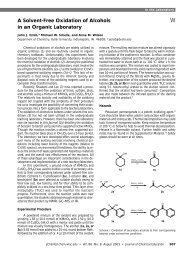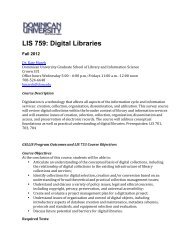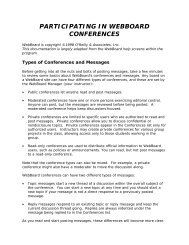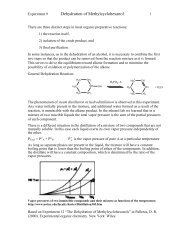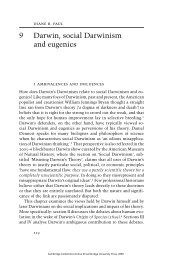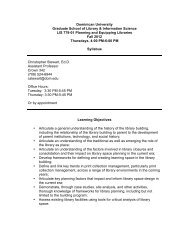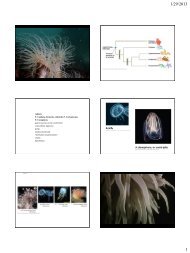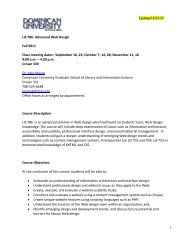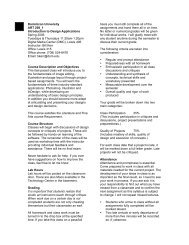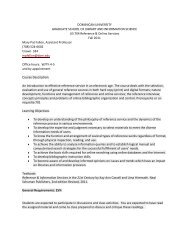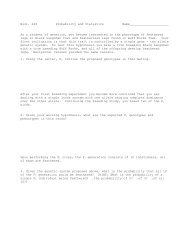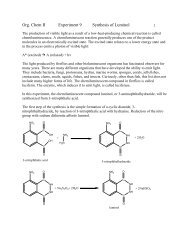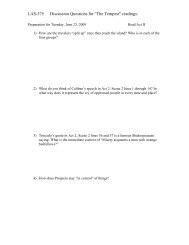SYLLABUS Organic Chemistry I CHEM253 Fall 2008
SYLLABUS Organic Chemistry I CHEM253 Fall 2008
SYLLABUS Organic Chemistry I CHEM253 Fall 2008
Create successful ePaper yourself
Turn your PDF publications into a flip-book with our unique Google optimized e-Paper software.
<strong>SYLLABUS</strong> <strong>Organic</strong> <strong>Chemistry</strong> I <strong>CHEM253</strong><br />
<strong>Fall</strong> <strong>2008</strong><br />
Instructor: J. Brent Friesen<br />
Office: 326 Parmer Hall<br />
Phone: 524-6972<br />
Email: jbfriesen@dom.edu<br />
Webpage: http://domin.dom.edu/faculty/jbfriesen/<br />
Class Format:<br />
Lecture A: Monday, Wednesday, & Friday 10:30-11:20; Thursday 11:30-12:30<br />
Lecture B: Monday, Wednesday, & Friday 11:30-12:20; Thursday 1:00-2:00<br />
Lab I: Wednesday 1:30 – 4:30 in Parmer 331<br />
Lab II: Thursday 8:30 – 11:30 in Parmer 331<br />
Lab II: Wednesday 1:30 - 4:30 in Parmer 331<br />
Attendance is MANDATORY at all class meetings<br />
Required Materials:<br />
<strong>Organic</strong> <strong>Chemistry</strong> 7 th ed. 2007<br />
By John E. McMurry Brooks Cole<br />
Duplicate Page Lab Notebook: Hayden-McNeil specialty products, Jones and Bartlett Publishers,<br />
or W.H. Freeman.<br />
Protective Safety Goggles. “Goggles” not “glasses.”<br />
Many Handouts will be distributed in this course.<br />
You will need a three-ring binder to organize them.<br />
Optional Materials:<br />
Molecular Model Kit. (Available in bookstore, online and from former <strong>Organic</strong> students.)<br />
Supplemental Materials: (on reserve at the library)<br />
Study Guide with Solutions Manual for McMurry's <strong>Organic</strong> <strong>Chemistry</strong>, 7 th ed<br />
By John E. McMurry Brooks Cole<br />
The <strong>Organic</strong> Chem Lab Survival Manual, by J.W. Zubrick,<br />
John Wiley & Sons, Inc. (The 7 th edition is most recent but the 5 th and 6 th are also fine.)<br />
Websites:<br />
http://domin.dom.edu/faculty/jbfriesen/chem253.htm<br />
http://blackboard.dom.edu
2<br />
Course Description:<br />
<strong>Chemistry</strong> is often characterized as the "central" science because of the many connections<br />
to other fields. Due to the relevance of chemistry in many disciplines, it is important that<br />
people in most scientific fields have some understanding of chemistry. This course will<br />
be the first semester of an overview of organic chemistry. <strong>Organic</strong> chemistry is the study<br />
of compounds that originate in living systems; therefore, it is recognized as an essential<br />
ingredient in the education of scientists in a wide range of fields, particularly the life<br />
sciences. The major foci of the course are to:<br />
1) understand the reactivity of organic compounds,<br />
2) to appreciate the role of structure in chemical identity and<br />
3) apply reactivity and structure to the understanding the of organic molecule function.<br />
This course in challenging and fast-paced. This means that a lot of material will be<br />
covered in a relatively short period of time. The crucial importance of organic chemistry<br />
dictates the pace. This course involves cumulative, vertical learning. That which is<br />
learned in the first and subsequent weeks is needed continuously, throughout the year,<br />
even into the last week!<br />
Course Objectives:<br />
1) Think Molecular! Molecules are interesting and important. Molecular thinking helps<br />
us understand how organisms function and helps us appreciate what is going on in the<br />
world in which we live. From the lecture, text, lab and problems in this course, you<br />
will be able to ask questions about natural phenomena and use models and metaphor<br />
to describe what is going on at the molecular level.<br />
2) Become acquainted with the language of organic chemistry. Every discipline has its<br />
vocabulary and terminology associated with it. <strong>Organic</strong> chemistry has much<br />
representational language in the form of functional groups, molecular structural<br />
formulas and 3-D representations.<br />
3) Familiarize yourself with mechanism-based chemical reactivity. Much of what we do<br />
involves using electron movement to explain and predict chemical reactivity.<br />
4) Synthesis and spectroscopy problem solving is a means of improving your problemsolving<br />
skills relating to real-world problems in the chemical sciences.<br />
5) Basic experimental techniques will be learned and practiced in the laboratory section.<br />
Creativity requires the courage to let go of certainties.<br />
Erich Fromm
3<br />
Academic Integrity Policy<br />
Students of the university must conduct themselves in accordance with the highest<br />
standards of academic honesty and integrity. Failure to maintain academic integrity will<br />
not be tolerated. The following definitions are provided for understanding and clarity.<br />
Definitions of Plagiarism, Cheating and Academic Dishonesty<br />
Student plagiarism is the deliberate presentation of the writing or thinking of another as<br />
the student’s own. In written or oral work a student may make fair use of quotations,<br />
ideas, images, etc., that appear in others’ work only if the student gives appropriate credit<br />
to the original authors, thinkers, owners or creators of that work. This includes material<br />
found on the internet and in electronic databases.<br />
Cheating entails the use of unauthorized or prohibited aid in accomplishing assigned<br />
academic tasks. Obtaining unauthorized help on examinations, using prohibited notes on<br />
closed-note examinations, and depending on others for writing of essays or the creation<br />
of other assigned work are all forms of cheating.<br />
Academic dishonesty may also include other acts intended to misrepresent the authorship<br />
of academic work. Deliberate acts threatening the integrity of library materials or the<br />
smooth operation of laboratories are among possible acts of academic dishonesty.<br />
Sanctions for Violations of Academic Integrity<br />
If an instructor determines that a student has violated the academic integrity policy, the<br />
instructor may choose to impose a sanction, ranging from refusal to accept a work<br />
product to a grade “F” for the assignment to a grade “F” for the course. When a sanction<br />
has been imposed, the instructor will inform the student in writing. The instructor must<br />
also inform the student that she/he has the right to appeal this sanction, and refer the<br />
student to the Academic Appeals Process described in the Bulletin of the Rosary College<br />
of Arts and Sciences. The instructor will send a copy of this letter to the Dean of the<br />
Rosary College of Arts and Sciences. The Dean will note whether a student has<br />
committed multiple violations of the academic integrity policy over time, and in such<br />
cases the Dean may institute a process leading to possible further sanctions, including<br />
suspension or expulsion from the university…<br />
“The ultimate goal in science education is no longer just amassing a body of<br />
knowledge, but it’s also developing the skills to go about answering questions<br />
independently. It is not possible for any one individual to learn that whole body of<br />
knowledge. Perhaps equally important is to be able to generate ways of thinking<br />
about questions that we have and how we might go about exploring those questions<br />
on our own.” Dr. Anita Greenwood, University of Massachusetts - Lowell
4<br />
Tentative Course Calendar:<br />
Date Topic Text Selection<br />
8/27 Introduction/Overview 1.1 to 1.4<br />
8/28 Bonding, & Hybridization, 1.5 to 1.8<br />
8/29 Structural Formulas 1.9 to 1.12<br />
9/01 Electronegativity & Formal Charges 2.1 to 2.3<br />
9/03 Resonance 2.4 to 2.6<br />
9/04 Acid/Base 2.7 to 2.10<br />
9/05 Acid/Base 2.11 to 2.13<br />
9/08 Functional Groups 3.1 to 3.3<br />
9/10 Alkane Conformations 3.6 & 3.7<br />
9/11 Alkane Classification & Nomenclature 3.4 & 3.5<br />
9/12 Cycloalkanes 4.1 to 4.3<br />
9/15 Cycloalkane Structure and Nomenclature 4.4 to 4.6<br />
9/17 Cycloalkane conformations 4.7 to 4.9<br />
9/18<br />
9/19 EXAM I (Chapters 1, 2, 3, and 4)<br />
9/22 <strong>Organic</strong> Reactions 5.1 to 5.4<br />
9/24 Thermodynamics & Kinetics 5.5 to 5.8<br />
9/25 Biological Reactions 5.9 to 5.11<br />
9/26 Alkenes introduction and Naming 6.1 to 6.3<br />
9/29 Alkene Stereochemistry 6.4 to 6.6<br />
10/01 Alkene Reactivity 6.7 to 6.11<br />
10/02 Preparation of Alkenes 7.1 to7.4<br />
10/03 Alkene Reactions 7.5 to 7.8<br />
10/06 Alkene Reactions 7.9 to 7.11<br />
10/08 Alkynes introduction and Naming 8.1<br />
10/09 Preparation of Alkynes 8.2 to 8.5<br />
10/10 Alkyne Reactions 8.6 to 8.9<br />
10/13<br />
10/15<br />
10/16 EXAM II ( Chapters 5, 6, 7, & 8)<br />
10/17 LONG WEEKEND<br />
10/20 Introduction to Stereochemistry 9.1 to 9.4<br />
10/22 Absolute Stereochemistry 9.5 to 9.8
5<br />
Date Topic Text Selection<br />
10/23 Diastereomers & Meso 9.9 to 9.11<br />
10/24 Fischer Projections 9.12 to 9.14<br />
10/27 Haloakane introduction and Naming 10.1 to 10.3<br />
10/29 Preparation of Haloalkanes 10.4 to 10.6<br />
10/30 Haloalkane Reactions 10.7 to 10.9<br />
10/31 Substitution Reactions 11.1 to 11.3<br />
11/03 S N 2 Reactions 11.4 to 11.6<br />
11/05<br />
11/06<br />
11/07 EXAM III (Chapters 9, 10, & 11.1 to 11.6)<br />
11/10 Elimination Reactions E2 11.7 to 11.9<br />
11/12 Elimination Reactions E1 11.10 to 11.12<br />
11/13 Summary of Substitution and Elimantion<br />
11/14 Infrared Spectroscopy 12.5 & 12.6<br />
11/17 Infrared Spectroscopy of Functional Groups 12.7 & 12.8<br />
11/19 Nuclear Magnetic Resonance Spectroscopy 13.1 to 13.3<br />
11/20<br />
13 C NMR 13.4 to 13.7<br />
11/21<br />
1 H NMR proton equivalence & chemical shifts 13.8 & 13.9<br />
11/24<br />
1 H NMR integration & spin-spin splitting 13.10 & 13.11<br />
11/26 THANKSGIVING HOLIDAYS<br />
11/27 THANKSGIVING HOLIDAYS<br />
11/28 THANKSGIVING HOLIDAYS<br />
12/01 NMR problems 13.12 & 13.13<br />
12/03<br />
12/04 EXAM IV (Chapters 9 & 12a)<br />
12/05<br />
12/?? FINAL EXAM (Cumulative)<br />
“We should never lose our zest for living, our excitement and enthusiasm, our curiosity,<br />
our desire to know. The person who does is certainly blind to the world, its miracles and<br />
possibilities, and one’s own possibilities.” Earl Nightingale
6<br />
Grading for <strong>Organic</strong> <strong>Chemistry</strong> : The grade for this course consists of both the lecture<br />
grade as well as the laboratory grade. The distribution of the grades will be:<br />
Quizzes (Best 40) Units of 5 points 20%<br />
Homework Assignments (Best 5) 20 points each 10%<br />
Laboratory 200 points total 20%<br />
Midterm Exams (Best 3 of 4) 100 points each 30%<br />
Final Exam 200 points 20%<br />
Letter Grade Assignments:<br />
100 > A > 92% 92 > A- > 90<br />
90 > B+ > 88 88 > B > 84 84 > B- > 82<br />
82 > C+ > 80 80 > C > 76 76 > C- > 74<br />
74 > D > 65<br />
Attendance:<br />
Class attendance is an essential component of this course. If you are absent you cannot<br />
receive the points designated for the class preparation or in-class quiz. You will lose 5<br />
points for every 15 minutes that you are absent during regular class time. Consistently<br />
missing class will not be tolerated. More than 8 missed class sessions will result in an “F”<br />
grade for the course.<br />
Why Should Students Attend Class?<br />
1) Attending class allows you to be part of a learning community. Learning has a<br />
personal and communal dimension, both of which are critical to the student.<br />
2) Interaction with the instructor is another reason you should attend class. The<br />
physical presence of an instructor has a holistic impact on each student that<br />
cannot be duplicated or replaced by a book, video or electronic<br />
communication.<br />
3) The presence of students in the classroom is part of the course design. In order<br />
to fulfill the purpose for which the course is offered, students must be present<br />
in the classroom during class time.<br />
4) The bottom line: you (and/or someone who loves you) paid for it!
7<br />
Lecture and Reading:<br />
The lecture time will be spent introducing new concepts, solving sample problems and<br />
going over problems areas that have been identified from graded homework and quizzes.<br />
Preparation for lecture is essential. The current text is very organized and readable. Make<br />
use of the many diagrams in the text, <strong>Organic</strong> <strong>Chemistry</strong> is a very visual discipline.<br />
Follow the problems solved in the text. Reading the book before lecture will help you<br />
assimilate new concepts easier and guide you to pose key questions about the material.<br />
Bring all graded papers and work-in-progress to class. Do not hesitate to ask questions<br />
about the worksheet you are currently doing.<br />
Exams:<br />
All examinations will be cumulative with the emphasis on the newest material. I will be<br />
glad to schedule a review before any of the exams if the interest is there. Exams must be<br />
taken the day they are offered. Any missed exams will be counted as a dropped score. No<br />
make-up exams will be offered until finals week.<br />
Quizzes:<br />
There will be at least 40 five-point quizzes. The format of the quizzes will vary. Quizzes<br />
may be given to prepare for the next class period. These are due at the beginning of the<br />
class period for which they are assigned. Online quizzes will be completed before the<br />
class period for which they are assigned. Quizzes given in class will be 5-10 minutes in<br />
length. There are no make-up quizzes. Quizzes are designed 1) to help you keep you up<br />
to date in the class, 2) to encourage you to do practice problems, and 3) to allow you to<br />
become used to my style of questions. You will be allowed to drop quiz problems if more<br />
than 40 are given.<br />
Homework:<br />
The only way to learn organic chemistry is to do problems. Thus, there will be homework<br />
worksheets handed out regularly (about one for each chapter). Please do your homework<br />
problems as they are covered in class. Be sure to raise pertinent questions in class about<br />
homework problems. This effort should help you to keep up with the material and come<br />
to class with questions about the material that is being covered. Be forewarned these<br />
problems are a minimum requirement! You should attempt to solve many of the chapter<br />
exercises, end-of-chapter problems, and web page exercises.<br />
In the event that homework problems will be collected, hand your homework in at the<br />
beginning of the class period the day it is due. Any homework handed in after it is due<br />
will receive a two-point deduction. No homework will be accepted after the homework<br />
has been graded and handed back. Extra credit will not be accepted on late work.<br />
Consistently handing in late homework will not be tolerated. In addition to the above<br />
penalties no more than two late assignments will be graded.
8<br />
Some Reflections On Teaching and Learning:<br />
My job is to identify and develop the major conceptual issues for the course and then to<br />
show how those concepts are used in understanding chemical reactivity. In addition, I<br />
hope to articulate the connections between concepts in this class, lab, and other classes<br />
that you are taking. I would also like to share with you some of the exciting modern<br />
advances in organic chemistry and the applications. In order to accomplish these goals, I<br />
would like to have an interactive classroom with feedback from you. This possibility<br />
means less lecturing and more discussion with a focus on problem solving and conceptual<br />
understanding. Hopefully, we can create an environment where it is possible to ask<br />
questions, take risks and even fail. Listed below are some suggestions which will help<br />
you to learn organic chemistry and will also help set up an interactive, constructive<br />
environment.<br />
1. Come to class. Regular attendance is expected. You are responsible for all<br />
information disseminated at all class meetings. If you are not there, you will miss the<br />
flow of events, the questions and discussion of your peers, and information given in<br />
the lecture.<br />
2. Work problems. Work all of the problems in the text and at the end of the chapter.<br />
Try to work the problems in a reflective manner. Test your understanding of<br />
concepts. Don't jump to the solutions manual if the answer is not immediately<br />
apparent. As the exams and quizzes will test your ability to apply the material to new<br />
situations and problems, it is critical that you understand the concepts. There are also<br />
be problems and exercises on-line at the <strong>Organic</strong> <strong>Chemistry</strong> Companion Page. If you<br />
are having difficulties, this might be a place to find extra insight.<br />
3. Read the chapter ahead of time. This suggestion does not have to be an intensive<br />
effort. A look at which functional groups are involved, the topic headings, and the<br />
type of reaction will give you some sense of where we are headed.<br />
4. Study diagrams and tables. They are more than pretty pictures. They can pull together<br />
what is being described in the text in a very vivid way.<br />
5. Explore the on-line supplementary materials. The animations are awesome and show<br />
chemical structure and reactivity in a very dramatic way.<br />
6. It is absolutely essential that you learn the vocabulary of organic chemistry. Important<br />
words and terms must be memorized. The textbook puts key terms in boldface and<br />
includes them in the "Key Terms" section at end of each chapter.<br />
7. If you are in trouble, ask for help. I have posted office hours at which time I will be<br />
available to answer questions. I will also be glad to make an appointment for other<br />
times. If you have a quick question, feel free to contact me by email. In addition, I<br />
will organize help sessions if a group of students are having difficulty with a<br />
particular topic or if the class requests a review session before an exam. Remember,<br />
in the end, you are responsible for learning.
9<br />
What do I need to remember from General <strong>Chemistry</strong>?<br />
There are several concepts from General <strong>Chemistry</strong> that we will assume you have learned<br />
and learned well. While we will review all of them in class, the reviews will be rather<br />
brief. It is absolutely essential that you have a solid understanding of these concepts. If<br />
you don’t, you had best go back and review them.<br />
1. Atomic structure and Periodic Trends<br />
You should know about atomic orbitals and electron configurations. In <strong>Organic</strong><br />
<strong>Chemistry</strong> we will be playing “Where’s the electron?” from beginning to the end. It is<br />
important to have a basic understanding of electrons of atoms in order to understand<br />
electrons of molecules. Periodic trends especially that of electronegativity, are useful to<br />
remember.<br />
2. Bonding and Molecular Geometry<br />
The principles of covalent bonding, ionic bonding, hybrid atomic orbitals and molecular<br />
geometries (Valence Shell Electron Repulsion Theory) are absolutely essential to<br />
understanding the behavior of organic molecules. It is very important to be able to draw<br />
the Lewis Structure, complete with non-bonding electrons and formal charges, of every<br />
molecule you come across.<br />
3. Electronegativity and Molecular Polarity<br />
Combining electronegativities of atoms in a molecule with its molecular geometry allows<br />
one to predict the overall molecular polarity, which is an essential step in predicting<br />
physical and chemical properties of organic molecules.<br />
4. Acid-Base Concepts<br />
Almost every single reaction in organic chemistry can be described in terms of an acidbase<br />
reaction, either by the Bronstead definition or by the Lewis definition. (The latter<br />
being far more common and important.) Also important is the concept of conjugate acids<br />
and bases and their relative strengths (weaker acid means stronger conjugate base, etc…)<br />
Know these concepts like the back of your hand!<br />
5. Equilibrium, Kinetics and Thermodynamics<br />
To understand organic reactions and mechanisms, we make extensive use of the<br />
principles of equilibrium (Including Le Chatelier’s principle), thermodynamics and<br />
kinetics. Unlike General <strong>Chemistry</strong>, though, we do very little mathematics in <strong>Organic</strong><br />
<strong>Chemistry</strong>. Rather, we are more often concerned with qualitative relationships between<br />
these principles, and we make extensive use of reaction coordinate diagrams to describe<br />
them. Be able to read, interpret, and draw reaction coordinate diagrams (also called<br />
potential energy diagrams).



